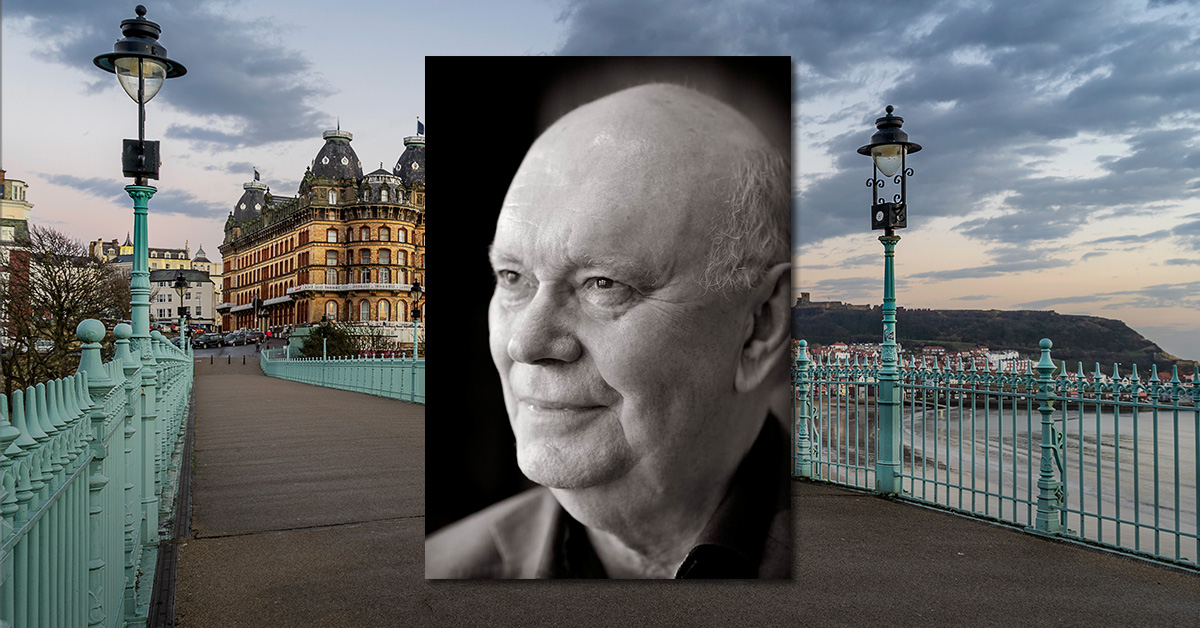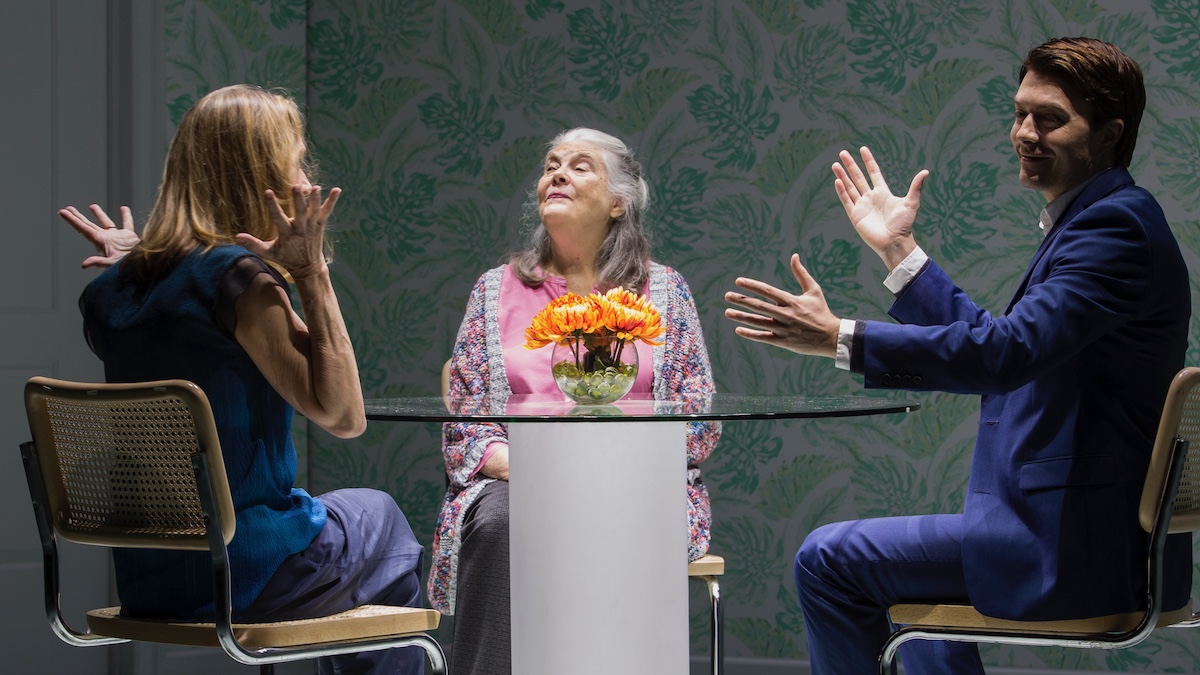
Here are five exemplary plays selected from Ayckbourn’s expansive oeuvre, from his first West End hit to critically acclaimed stage works.
Relatively Speaking (UK)
Alan Ayckbourn once described this 1965 comedy as “well constructed,” as he aimed to write a “well-made” play to shatter theatrical conventions and break golden rules. He also hoped to make audiences laugh when their seaside summer holidays were spoiled by the rain and they headed into the safety of the theatre.
The playwright’s first West End hit, Relatively Speaking made Ayckbourn a household name. Critics hailed the play as the arrival of a great new comic talent, and Noël Coward praised the young writer for creating “a beautifully constructed and very funny comedy.”
“I think there might have been a certain amount of misunderstanding.”
Though Greg and Ginny are living together, Greg suspects that he is not the only man in Ginny’s life. He wonders about Ginny’s plan to “visit her parents” and decides to follow her. In truth, she is going to see her considerably older lover, but only to break up with him. Greg arrives and mistakes the ex-lover and his wife for Ginny’s parents. Of course, Ginny eventually shows up as well, compounding an already wildly hilarious situation.
The Norman Conquests: Table Manners (US/UK), Living Together (US/UK), Round and Round the Garden (US/UK)
The Norman Conquests, which premiered in 1973, is a trilogy of full-length comedies concerning a man named Norman and his family. The plays are not consecutive; instead, all occur during a single weekend in different parts of the same English country house: in the dining room (Table Manners), the living room (Living Together) and the garden (Round and Round the Garden). Thus, audiences watch events that take place simultaneously with those they have already seen, or are about to see. Each play is complete in itself and can be played alone, or as a group they can be performed in any order. However, each benefits when produced with the others. One common factor connecting the plays is Norman’s inadequate attempt to involve himself in turn with his sister-in-law, his brother-in-law’s wife and his own wife.
Ayckbourn employs his distinct, razor-sharp, caustic wit to highlight the secrets, lies and deceit that lurk beneath the surface of family relationships in these critically acclaimed plays. He ably taps into the mind-numbing tedium of daily human suffering through comedy and tragedy, exploring universal themes of loneliness, family disagreement and fear. With a Chekhovian flair, The Norman Conquests uproariously highlights the slow and quiet crushing of spirit through six ordinary characters and their daily domestic events.
Bedroom Farce (US/UK)
In this raucous 1975 comedy, Ayckbourn brilliant combines elements of farce and claustrophobia, distilling the drama into three bedrooms over the course of one endless Saturday night. Cleverly manipulating time and space, Ayckbourn explores the ups and downs of four marriages: older Delia and Ernest, their son Trevor and his wife Susannah, young Malcolm and Kate, and Trevor’s ex-girlfriend Jan and her husband Nick. Gleefully contrasting the younger and older generations, Ayckbourn keeps adding complications and revelations that only seem to further damage the characters’ relationships. Yet somehow, Ayckbourn hopes the characters progress, develop and resolve their issues in their own way and pace.
“Perhaps none of them finds instant happiness or sudden great self-insight. But at least they retain the dignity of resolving their own destinies.” – Alan Ayckbourn
The playwright himself adapted the play for television in 1980, starring Michael Denison, Joan Hickson, Brenda Blethyn and Stephen Moore. The play was also broadcast in two parts on BBC Radio 4 in 2022-3.
Man of the Moment (US/UK)
A joint winner of the 1990 Evening Standard Theatre Awards for Best Comedy, this hit 1988 play was created during Ayckbourn’s middle period, when he created larger-scale, so-called “social” pieces. With this and other plays of the 1980s, including A Chorus of Disapproval, he delved into contemporary morality and the definition of good and evil. In Man of the Moment, a peak work of this era, Ayckbourn focuses on how the press may slant and exploit public opinion and present false information. It is a darkly humorous work that challenges contemporary morality and the boundaries of the media. He felt that his play, which was the first to be set in a foreign nation (apart from the imaginary locales of the family plays), marked a new direction for his writing.
Television producer Jill Rillington is taping a documentary which will reunite Vic Parks with Douglas Beechey. Seventeen years ago, Douglas inadvertently foiled Vic’s last bank robbery, during which Vic shot a teller in the face. Vic, a callous boor, served his time and then exploited his celebrity status to become a wealthy television personality. Now, at Vic’s luxurious Mediterranean villa, Jill’s hopes for a fiery confrontation are fading because amiable Douglas shows no envy or bitterness, and happy people make rotten telly material. Will Vic ever receive his just deserts?
House (US/UK) & Garden (US/UK)
This linked pair of plays, which premiered in 1999, was designed to be staged simultaneously in adjacent auditoria, featuring the same cast. Set at a large country house in the summertime, House takes place in the drawing room and Garden is set on the grounds. In both the original Scarborough and the subsequent National Theatre productions, the performances were followed by a garden fête in the theatres’ foyer. This event became a “third act,” uniting both audience and company to participate in browsing and purchasing homemade produce, enjoying alcoholic refreshments and playing garden games.
Teddy Platt, whose marriage is spectacularly on the rocks, is visited by the creepy Gavin Ring-Mayne, who urges him to stand for Parliament. At the same time, Teddy’s jilted mistress threatens suicide as a garden fête is prepared. With the title, Ayckbourn parodies the magazine House & Garden, whose country homes and gardens are frequently depicted as serene, dreamlike settings. Like many of Ayckbourn’s works, the two linked plays present bittersweet interactions between unhappy and frustrated middle-class people, with reliably hilarious results.
We chatted with Alan Ayckbourn’s son Philip Ayckbourn for his thoughts on Alan’s long-lasting career and incredible output of staged works.
How would you explain the enduring success and appeal of Alan’s works? What’s his magic touch on audiences, actors and communities?
PA: I think the enduring success of Alan’s works is due to his ability to tap into the perennial human array of hopes, desires, frailties, passions, doubts, insecurities, fears and longings that visit us on a daily basis. Despite the evolving landscape of social, political and technological advancement, some fundamental things about us humans refuses to change. We still make poor romantic choices, we continue to misunderstand and misinterpret one another. We still find ourselves embroiled in family dramas, and we endlessly hold expectations for ourselves and others that more often than not go unfulfilled. So his plays and characters are eternally recognisable to us. This of course is served to us with a very large helping of humour and keen observation. His ability too to reinvent his style and connect to the zeitgeist has not only kept his loyal following but has also attracted younger audiences to his plays.
In addition to the plays on our list, which plays would you pick for a theatre to put on?
PA: It’s hard to pick a favourite, and it would depend on what mood I’m in. For sheer comedy, I’d pick Taking Steps (US/UK), Bedroom Farce, Absurd Person Singular (US/UK) and Season’s Greetings (US/UK). For situation comedy with a dark undercurrent, I’d pick Absent Friends (US/UK), Just Between Ourselves (US/UK), Man of the Moment and Way Upstream (US/UK). For psychological intrigue and perhaps social commentary, I’d pick ones such as Truth Will Out, Henceforward (US/UK), Drowning On Dry Land (US/UK) and Constant Companions. For a ghost story, I’d choose Haunting Julia (US/UK); and for musicals, I’d go for Dreams From A Summerhouse (US/UK). Of course, one is spoilt for choice with such a sizeable oeuvre to choose from.
To license a production of Alan Ayckbourn’s work, visit the Concord Theatricals website in the US or UK.

A Children’s Theatre Classic: An Interview with Snow White And The Seven Dwarfs Composer Michael Valenti

Inspired by True Events: A Conversation with Playwright Ryan Spahn

